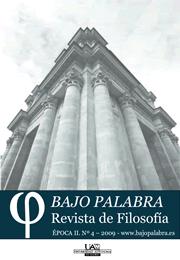The System of Time and the Epos of History: Schelling and the Historicity of the Absolute
Keywords:
Schelling, History, Historicity, Temporariness, Absolute, EposCopyright (c) 2009 A. Carrasco Conde

This work is licensed under a Creative Commons Attribution 4.0 International License.
Abstract
The question regarding the Historicity (Geschichtlichkeit) of the Absolute, of Time and of the course of history causes Schelling to turn every scientific presentation on the Absolute into a story in which the Past, Present and the Future come together in reverberations of a process-oriented, Historical Totality that should be epically narrated. These reverberations outline an understanding of Time that, far from being understood as a succession of “now-points”, present the Past (Vergangenheit) as that which never ceased to be: tò tì ên eînai (quod quid erat esse); the Present (Gegenwart) as «Gegen-wart», that is, like a “being vigilant” (warten) “against” (gegen); and the Future (Zukunft) as that which the Present achieves, once nurtured by the Past itself: the „what?s to come? (Zu-kunft). The dynamic of this system of time is the intended explanation; a dynamic in which the Absolute shows itself as pure Historicity (Geschichlichkeit).
